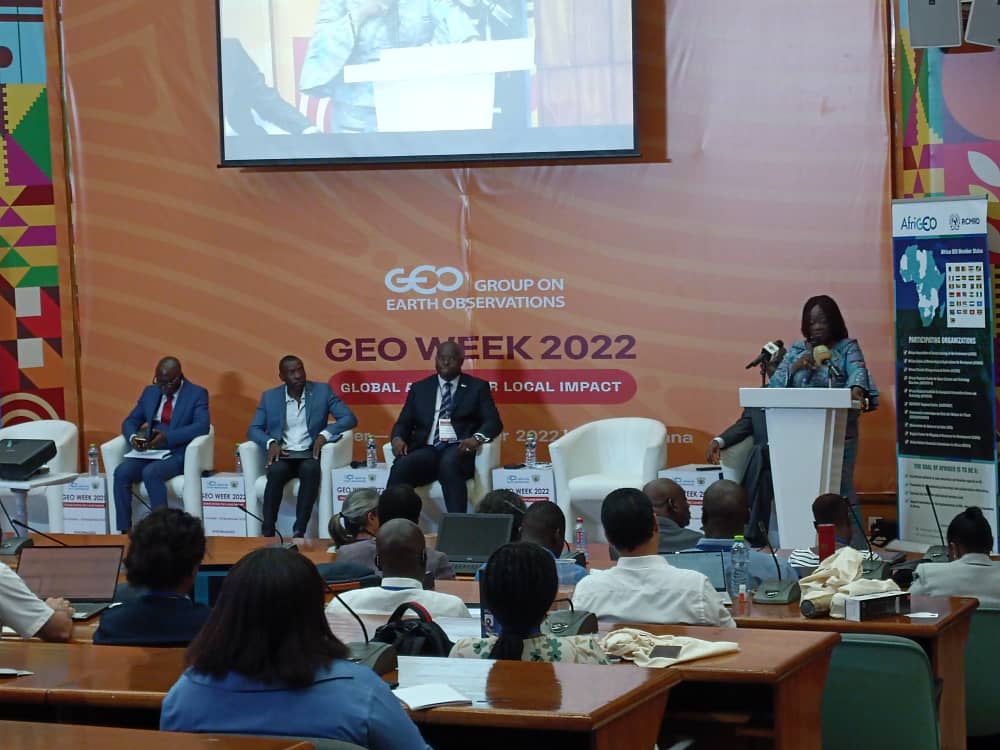
Ghana – The Ministry of Environment, Science, Technology and Innovation (MESTI) has urged the public to desist from encroaching on lands set aside for earth observatory activities.
According to the Ministry, the operations of bodies such as the Ghana Radio Astronomy Observatory and the Ghana Space Science and Technology Institute (GSSTI) rely on the transmission of waves which could be affected by appliances such as microwaves and mobile phones.
Speaking on the sidelines of the ongoing Group on Earth Observations (GEO) in Accra, the Chief Director of MESTI, Cynthia Asare Bediako warned that such devices could distort the information that was being gathered by critical players in Ghana’s earth observatory space.
Madam Bediako noted that Ghana had developed a space policy that she indicated would elevate the Ghana Space Science and Technology Institute (GSSTI) to the status of authority as part of its implementation.
She said the elevation of the GSSTI would enhance and empower it to enhance earth observatory activities in Ghana.
She also assured of the government’s commitment to supporting findings and outcomes from the GEO week, adding that the symposium provided the Ministry with the opportunity to outline its programmes and policies.
Ghana Geo Week
Ghana is hosting GEO Week 2022, the 18th Annual Meeting of the Group on Earth Observations (GEO), from Monday, October 31 to Friday, November 4, 2022, at the Accra International Conference Centre.
Amid mounting environmental challenges and rapid technological advances, the meeting will make evident how global partnerships are accelerating the use of Earth observations to inform better local decisions on issues such as climate adaptation as well as food and water security.
Get New DJ Mixes
Earth observations are data and information collected about our planet. This includes satellite data, as well as in situ data collected on the ground. GEO is a global partnership that works to make these observations openly available around the world. It also convenes partnerships which produce Earth observation-based tools and services to enable better decisions, policies and investments.
Ghana, represented by the Ministry of Environment, Science, Technology and Innovation (MESTI), has been a member of the GEO since 2010 and is honoured to host GEO Week 2022. The event will feature several high-level speakers, including H.E. Vice President of Ghana, Dr. Mahamudu Bawumia, who will deliver the keynote address during the Opening Session of the Plenary on Wednesday, November 2, 2022, at 9:00 am.
Other high-level speakers include Ghana’s Minister responsible for Environment, Science, Technology and Innovation (MESTI), Dr. Kwaku Afriyie; Ghana’s Minister responsible for Lands and Natural Resources, Hon. Samuel Abu Jinapor; Dr. Thembi Xaba, Managing Director, Digital Earth Africa; Dr. Paul Desanker, Manager, Adaptation Division of the United Nations Framework Convention on Climate Change (UNFCCC )Secretariat; as well as Ms. Nicole LeBoeuf, Assistant Administrator, National Oceanic and Atmospheric Administration (NOAA), National Ocean Service.
Efforts
As part of efforts to combat land degradation and desertification in both urban and rural areas in Ghana, the University of Energy and Natural Resources (UENR) will next year introduce Land Degradation Neutrality (LDN) programmes at the postgraduate level.
According to the Vice Chancellor of UENR, Professor Elvis Asare-Bediako the institution will draw on over 10 years of experience and expertise of its staff to support Ghana’s contribution to the objectives of the UNCCD by introducing Land Degradation Neutrality (LDN) programmes at the postgraduate level to build resilience on sustainable land management and restoration, advance inclusive, and sustainable development.
He said the university was working tirelessly to start its graduate courses (MSc., MPhil., PhD) in Land Degradation Neutrality (LDN) under the School of Mines and Built Environment.
“Hopefully students would be admitted into these programmes starting January 2022. Moreover, the School of Science was on March 11, 2022, officially given approval to host the Digital Belt and Road (DBAR) Initiative for Big data for SDG in the sub-region,” Asare-Bediako said in a separate interview at the ongoing Group on Earth Observations (GEO) in Accra.
“Plans are underway to officially launch it. Having this Centre would contribute to making sound informed decisions on developmental matters and SDG 14 (Life below water) and 15 (Life on land)”.
SOURCE: GRAPHIC
